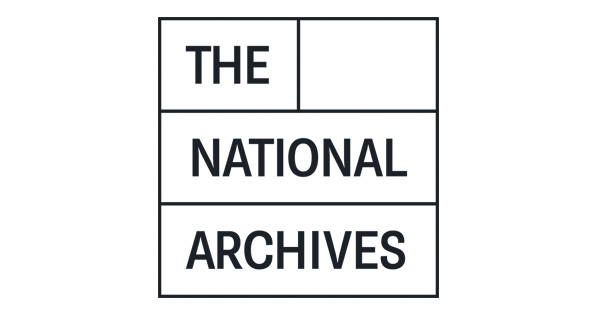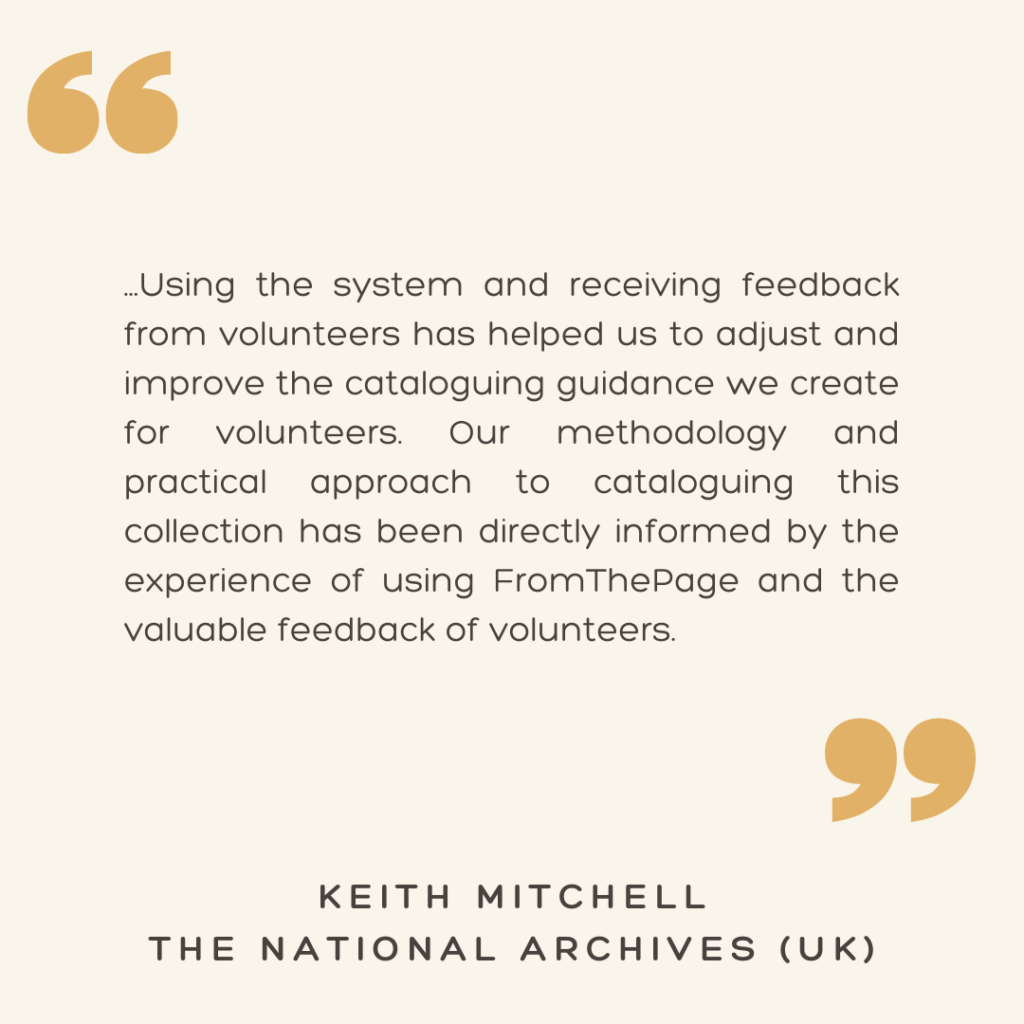Keith Mitchell of The National Archives (UK) kindly took the time to answer questions from Sara Brumfield of FromThePage, and discussed their project and experience using the platform.
Keith Mitchell is the Volunteer Projects Supervisor at The National Archives (UK).
First, tell us about your documents.
We are asking volunteers to transcribe a varied array of British Government documents. The National Archives (also formerly known as the Public Record Office).
Our first collection we put up were the 1851 Ecclesiastical Census Returns. This soon proved how the platform could work for some of our records.
During the summer of 2020, sitting at home, we added the British army officer’s service records and then further solders and officers records from another pre 1913 collection. These were all records previously digitised from microfilm copies. We have since added COPY 1 and Merchant Seaman registers of certificates of service.
The COPY 1 files we are cataloguing are entry forms for paintings and drawings registered for copyright protection between 1862 and 1912. From 1862, artists and publishers could protect paintings and drawings under the new Fine Arts Copyright Act, and to do so they had to submit a form to the Stationers’ Company and attach a copy of the work they were registering. Those forms make up this collection. They are really fascinating records because they give us an insight into creative industries of the period, with real examples of illustrations, cartoons, postcards, advertisements, greetings cards and much more.
The BT 124 Merchant seaman certificates are registers. The volunteers have highlighted a near duplication with records on Ancestry.co.uk. Those are the application cards held by the National Maritime Museum, London. These will compliment. These projects are aiming to add material to our own catalogue, Discovery.
What are your goals for the projects?
The overall aim is to make our records more accessible.
In the case of the COPY 1, transcribing the information from the entry forms into our catalogue Discovery. Currently, there is no way to search this collection, and in order to access it, researchers have to leaf through thousands of entry forms in hundreds of boxes to find what they are looking for. With the help of volunteers cataloguing this material, soon researchers will be able to search and browse by the names of artists and publishers, addresses, keywords and dates for the first time.
It was slightly different for the British army officers records. The National Archives had previously used a card index to catalogue officer’s records. Produced in the 1980s this card index was known to be inaccurate and incomplete. This project allowed us to correct and improve the catalogue. Where a piece had thirty officers listed, we now have over 100, and we have included genealogical information, such as wife and children where given.
How are you recruiting or finding volunteers/collaborators?
The National Archives have a dedicated section of our website for volunteering. We use these pages to promote both onsite and remote or online projects. We also use our quarterly newsletter to promote projects. Although this is more for our onsite volunteers. We don’t have an email list as such, but we are trying to incorporate a remote aspect as well. Results from our volunteer survey are also published on these pages.
Going forward we want to expand on how to use volunteers, and liaise with local and national volunteer projects and organisations. This will help our aim to diversify both our volunteer ‘pool’ and the opportunities to volunteer with us.
Can you share your experience using FromThePage?
My colleague who runs the COPY 1 project answered this:
Using FromThePage has been a really brilliant experience for this project. Firstly, the project has had contributions from so many volunteers all over the world, which has meant that the cataloguing has been completed much more quickly than would be possible with individual volunteers working on site at The National Archives. Secondly, using the system and receiving feedback from volunteers has helped us to adjust and improve the cataloguing guidance we create for volunteers. Our methodology and practical approach to cataloguing this collection has been directly informed by the experience of using FromThePage and the valuable feedback of volunteers.
I have added my experience as well. The volunteers who have transcribed the records are excellent. Finding records related to the subject beyond the scope. One has found his great-great-grandfather’s merchant navy record; whilst another highlighted a correspondent from Van Diemen’s Land, in 1824, was one of the first Australian wine producers in Australia.
One issue we found was where the documents vary by type, such as a list and then separate pages for each entry. This resulted in two projects to capture different aspects and details of the same document. Takes a little more time to set up, but is clearer to the volunteer when transcribing.
How does FromThePage & crowdsourcing fit with historical research?
Today’s culture is the ‘Google’ or internet search engine research. In other words if the result doesn’t come up in a catalogue search, then it doesn’t exist. Archives don’t work like that. We hold a vast collection, dating back nearly 1000 years. The Doomsday Book may the oldest ‘public record’, but we do hold a record from 976AD. The records of the State Papers to 1782, Foreign and Colonial Office records and the Cabinet and Prime Minister’s Office are just a range of British Government records available for searching historical events. We only truly know what is in approximately 10% of the records we retain, around 15% we may have a good idea, but the remainder is largely a mystery.
The National Archives have used onsite volunteering projects for over 30 years. Our first main crowd sourcing project in 2014 regarded First World War battalion war diaries. Although successful from a volunteer aspect, we learnt a lot about what we required and the data we needed to catch. Using Fromthepage.com has allowed us to attract a wider range of volunteers and capture records we can easily convert to upload to our catalogue.
The result is we can open up the records for more people to find records relating not just relating to British history, but also to worldwide history.
Using volunteers and utilising crowdsourcing options we can open up our records; and help researchers search and find documents relating to their subject.
This will help the conservation of documents as researchers don’t need to make speculative searches of documents to find what they are looking for.
What would you tell folks considering a similar project?
Plan the project and think about what you want. Plan the project depending on how you want the data to be displayed on your own catalogue or result of the project. We are adding tagging to the results for easier searching in the future. Imagine looking for a John Smith, currently you will find all the Smiths (Gold, Silver or Black) named John, as well as the John Smiths. Tagging can ultimately mean you only find the surname Smith, not occupation Smith. Without crowdsourcing and set fields for names, occupations and dates, this would be very time consuming to go through the catalogue.
How will the volunteer complete the work you have asked them to do? Is the form or page you set up correct and suitable for the document?
Establish the rules or instructions and be ready to adapt those when required. Also follow up questions as and when required.
Want your government documents transcribed by dedicated volunteers? Schedule a call with Ben and Sara.






